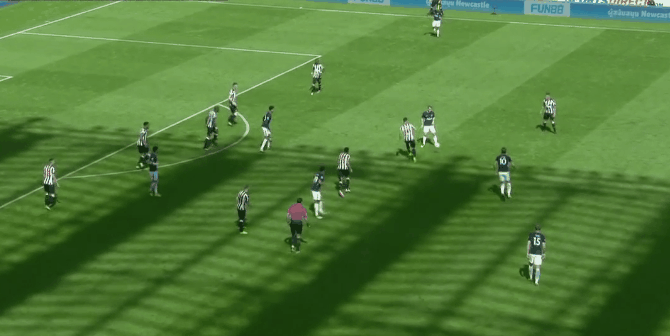
Christian Eriksen: Strategic Misses
I love soccer. I love playing it (badly) and I love watching it.
Like much of the world, I have developed an affinity for the English Premier League (EPL) because of its competitiveness and variety of gameplay. Unlike other big leagues, different team strategies and tactics really stand out.
In the EPL, there’s no team I like to watch more than Tottenham Hotspur—and on Tottenham, there’s no player I like better than Christian Eriksen.
Mediocre
Most people would probably disagree with me, putting about 30 players in the EPL ahead of Eriksen for their favorite. Even within Tottenham, many people would argue Harry Kane, Dele Alli or Son Heung-Min are more entertaining/talented players.
And, to be fair, they have some data to back them up. Look at this stats table from the 16/17 season:
| Player | Shots | On Target | Goals | Goals to Shots |
| Kane | 110 | 58 | 29 | 26.4% |
| Dele | 94 | 44 | 18 | 19.1% |
| Son | 80 | 33 | 14 | 17.5% |
| Eriksen | 133 | 45 | 8 | 6.0% |
Kane appears to be the clear winner. In fact, he did so well in 16/17 he managed to earn the EPL’s Golden Boot award for the second consecutive season—despite being out injured for several games.
Eriksen appears to be the big loser. He took more shots than any other player on Tottenham and scored at a third of the rate of Dele and Son, and less than a quarter of the rate of Kane. He also had the most opportunity to score, playing more minutes than any of the other three.
Yet, I still love seeing Eriksen shoot, even when he misses.
Great Dane
Tottenham is my favorite team to watch because of how they can glide through an opponent’s defense. The players seem to always know where their teammates are running and where they should pass. Once they’ve moved inside the box, they seem to be unstoppable. Just look at this goal during Sunday’s game against Newcastle.
I love Eriksen because he’s usually the playmaker behind this approach. He is a super-accurate passer and always delivers balls for the dangerous attacks made by Kane, Dele, and Son. Not surprisingly, he ranked second in assists for the EPL’s 16/17 season. Here’s how Tottenham got their first goal against Newcastle; it’s a typical Eriksen delivery.
Thinking Outside the Box
But why does he shoot and miss so much?
Eriksen’s low conversion rate on shots is because he takes a LOT of shots from the same place he passes: outside the goal box. By the end of the first half of the game against Newcastle, Eriksen had already ripped two shots far from the goal. Neither were close to scoring.
You’d be right to wonder why he doesn’t always pass. He’s got great accuracy and a proven track record of good assists. He’s delivering balls to players that are three or four times more likely to score off a shot than he is. His best option is always to make a pass.
But, sometimes, this happens.
Or this.
When Everyone Knows It’s a Bad Choice
Defense in games is about allocating resources to match a threat. In soccer, that means either keeping an eye on particular players or putting defenders where they interrupt the offense’s preferred strategy.
What do we know about Tottenham’s offense? In the 16/17 EPL season, Kane, Dele and Son were responsible for 71 percent of the team’s goals and can convert on 17-26 percent of their shots. Eriksen converts on just 6 percent of his shots, and made up less than 10 percent of all 16/17 goals. He averaged just one goal every five games
So, if you’re the defense, you shouldn’t worry about Eriksen shooting.
However, take a look at this still from the first goal.

As Eriksen makes the pass, FOUR Newcastle defenders are watching him and waiting for the shot. Meanwhile, Dele is left with an open run that will get him a goal.
The reality is this: Eriksen shouldn’t be shooting, but he still does. His stats say he should always be passing the ball off to someone that scores more reliably. But, by this point in the Newcastle match, Eriksen had already ignored open passes in favor of outside shots multiple times. This seems like incredibly foolish behavior.
Constructing the Win-Win
So from a basic odds analysis, Eriksen plays badly. However, consider these two extremes:
- If Eriksen never shoots, he would not need to be guarded. All defenders can stay in the box and disrupt Kane/Dele/Son.
- If Eriksen always shoots, he would be guarded very closely, reducing the success of his shots further and eliminating has value as a passer.
For Tottenham, who generates goals from inside the box, it is imperative the first statement does not happen. Success of the team’s tactics relies on getting defenders out of the goal box. When Eriksen sets a standard of risky shots, it forces the defense to send someone out to stop him; however, because he doesn’t make many of them, he isn’t guarded until he has the ball—which allows him to receive and distribute quick passes with little interference.
Ultimately, the shots construct a win-win. Either Eriksen scores from an outside shot (good) or he draws people out of the box (good). Shots are part of a great tactic that supplies either goals or a future strategic advantage. Tottenham recognizes that he needs to be shooting even though he almost certainly will miss.
This is an important aspect of game theory to understand when repeat decisions are involved. Although the statement “passing is always Eriksen’s best option” is true, the statement “always passing is Eriksen’s best option” is wrong.
For anyone that is a baseball fan, this concept is nothing new; stealing bases is built on this exact same principle. Even though a steal is incredibly risky for relatively low payoff, its real value is not advancing the runner, it’s the constant distraction of a pitcher who needs to watch the runners. If a player is good at stealing, it does more for the current batter than it does for him.
Conclusion
I love watching Tottenham because they operate as a unit. Eriksen is central to this approach. His ambitious long-shots seem like incredibly selfish behavior, but they are actually a contribution to the team. His skill manifests in the success of others.
For the rest of us, I think this is a good bit of game theory that everyone should keep in mind. Attempts—even those that fail—can successfully advance a strategy. Suboptimal behavior sends a message to opponents and can draw their attention away from the place where you wish to advance.